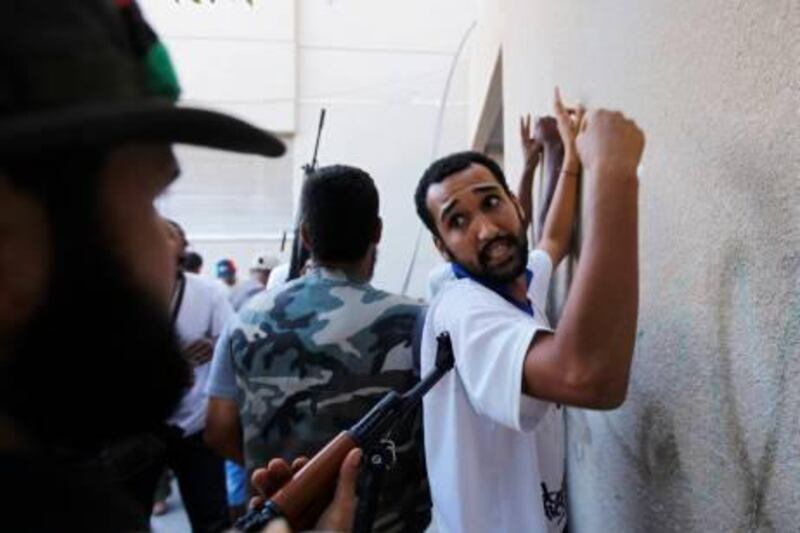TRIPOLI // Not until prison vans rolled up to a sports centre here to collect detained men did their wives and sisters begin to scream.
"Anyone with dark skin, they say he's a mercenary," said Fatma, 23, a young Libyan of Chadian roots, bursting into tears.
With Col Muammar Qaddafi toppled, Libya's interim leaders from the National Transitional Council (NTC) have fixed a new target: sub-Saharan Africans suspected of fighting for the old regime.
While NTC officials promise humane treatment and speedy investigations, the mass arrests are raising tension between Tripoli's Arabs and people who come from Chad, Sudan, Ghana and Nigeria and other sub-Saharan countries.
The arrests also drew warnings this week from Amnesty International and Human Rights Watch. The African Union has refused to recognise the interim government partly over fears that NTC forces have indiscriminately killed black people.
The NTC has ordered its forces to respect international law and urged Libyans to avoid revenge attacks. But sub-Saharan Africans remain fearful.
"There are too many guns and too much chaos," said Ali Hadar, 30, who was born in Libya but whose tribal ancestry is linked to Chad.
Much similar to Mr Hadar's case, the sweeps are further complicated by confusion over where people come from, whether they possess weapons, and if so, why.
Mr Hadar, an oil company employee from the town of Sebha who lives in Tripoli's old city, bought a Kalashnikov rifle in May from a Nigerian mercenary for protection, he said, but gave it to a pro-NTC sheikh as NTC fighters entered Tripoli.
On Monday Mr Hadar's neighbour, Azzedine Meshergui, escorted him for questioning to the local NTC headquarters: a sports centre facing the harbour beside a second-century Roman arch.
Council officials were respectful but disorganised, Mr Hadar said. He spent Monday night confined with hundreds of other men, and was released on Tuesday after Mr Meshergui returned to vouch for him.
"There are mercenaries here, but Ali isn't one of them," Mr Meshergui said later.
Dozens were still at the sports centre on Tuesday night, sitting on a football pitch beneath fluorescent lights. Mustafa Belhaj a council volunteer, attempted to explain why they were being held.
"We're all Muslims and brothers," said Mr Belhaj, a jeweller in the gold souq. "If you know anything about militias, tell us. These people must be put on trial."
There were cries of "Allahu Akbar", but also complaints. Soon Mr Belhaj was surrounded.
"Sir, the companies that employed us have all closed," said one man.
"The companies will return, inshallah," said Mr Belhaj. "Please, be patient."
"We have no weapons," said Osman Adam, 38, a street cleaner from Niger who gained citizenship after arriving in Libya two years ago. "There are people with weapons, but we don't know them."
NTC officials had quickly released some men, Mr Hadar said. But he was rearrested on Wednesday - this time at gunpoint.
It was the the first day of Eid Al Fitr. A group of NTC fighters left the sports centre in high spirits.
"We're going to get some mercenaries," said Nizar Miladi, 20. The boys toted Kalashnikovs, and Ahmed Merimi, 18, wore a black balaclava.
They stopped outside Mr Hadar's house. Inside, Mr Hadar and his family heard pounding on the door and voices crying, "Come out! All the men!"
Mr Hadar was detained with four other men, identified later by his sister, Miriam Adam, as their brother Aboubakr, 24, their uncle Moussa Abderrahman, and two guests named Issa and Ahmed.
The men walked silently in their white Eid robes. Suddenly, Mr Merimi struck one of them on the head.
"No!" cried an NTC fighter named Abderraouf, 20. "No hitting!"
Soon Mr Hadar and his companions were locked in the sports centre.
A group of women formed outside. They wore black robes and coloured headscarves, and several had children in tow.
The women were conferring in hushed voices when behind them someone yelled the slogan of the day: "Libya free!"
Fatma spun around in anger. "Libya free, indeed!" she cried bitterly.
Then police vans rolled into the parking area. One by one, the women crumpled in tears.
Fatma put an arm around her friend, Aisha Ahmed, 20, a nursing student whose brothers Mohammed, 24 and Brahim, 18, had been detained hours earlier, she said.
"Don't cry," said an Arab man watching from some steps. "Nothing bad will happen to them."
"How can I not be afraid?" said Ms Ahmed through sobs. "No one will tell us anything!"
The detained men were among some 200 sent on Wednesday from the old city to prisons for investigation by teams including lawyers and judges, said Salem Essalem, the NTC official directing the transfer.
Mr Essalem and others associate sub-Saharan Africans with Col Qaddafi, who opened Libya to foreign workers. Reports of mercenaries have hardened suspicion.
"This, this is Libya," Mr Essalem said, pointing to his arm. "These people are Africans. They attack us and defend the Qaddafi regime."
Mr Essalem showed two military ID cards he said belonged to detainees.
On Tuesday night unknown assailants attacked the sports centre, killing Mohamed Essadous, a guard, and injuring Mohaned Ali Sherala, also a guard, and stealing weapons, he said.
The NTC fighters formed a line to keep the women back. Fatma faced off with Mr Merimi, who was still wearing his mask.
"You're not Libyan, you're Chadian!" he said.
"I'm Libyan!"
"Chadian!"
"Libyan! I was born in Tobi - how can you say I'm not Libyan?" Fatma said, referring to a Tripoli hospital.
Nearby, Mr Belhaj was trying to calm screaming women. He had dressed in a cream-coloured suit of embroidered silk for Eid, and his eyes were reddening.
Finally the detained men filed out of the sports centre and into the vans, which pulled away with a blaring of horns.
"They're taking our men!" Fatma said. "Now there is no one to defend us, and we're black."





